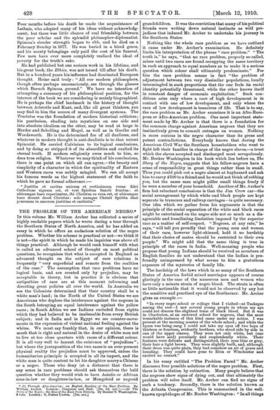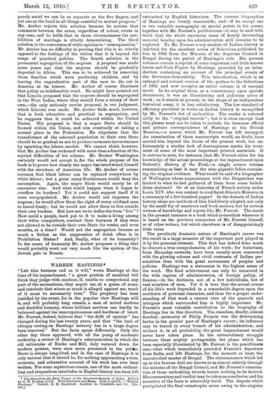THE PROBLEM OF THE .AMTIRICAN NEGRO.* IN this volume Mr.
William Archer has collected a series of highly readable papers which he wrote during a tour through the Southern States of North America, and he has added an essay in which he offers an audacious solution of the negro problem. Whether his scheme is practical or not—we think it is not—the spirit in which he made his inquiries was above all things practical. Although he would rank himself with what is called an advanced school of thought on most political questions, he recognises that what is accepted in England as advanced thought on the subject of race relations is frequently " very superficial and remote from the realities of the case." The assumption that race problems have no logical basis, and are created only by prejudice, may be acceptable in theory, but in practice it is obvious that antipathies of race are at this moment informing and directing great policies all over the world. In Australia we see the Colonists determined that their country shall be a white man's land; in the North of the United States we see Americans who deplore the intolerance against the negroes in the South betraying an equal intolerance against the yellow races ; in South Africa we see Indians excluded from rights which they had believed to be inalienable from every British subject; and in India and in Egypt we see counter-move- ments in the expression of violent national feeling against the whites. We must say frankly that, in our opinion, there is much that is right and natural in the desire of white men not to live at too close quarters with races of a different colour. It is all very well to lament the existence of " prejudices " ; but where the juxtaposition of the two races is an ever-present physical reality the prejudice must be approved, unless the humanitarian principle is accepted in all its import, and the white man is quite content to let his daughter marry a Chinese or a negro. Those who deny (at a distance) that there is any sense in race problems should ask themselves the bald question whether they would wish to have Asiatic or African sons-in-law or daughters-in-law, or Mongoloid or negroid • (1) Through Afro-America: an English Reading of the Rats Problem. By William Archer. London : Chapman and Hall. (108. 6d. net.]—(2) The Story of the Negro : the Rise of the RaceJram Slavery. By Booker T. Washington. 3 vols. London : T. Fisher trawin. [oet. net.]
grandchildren. It was the conviction that many of his political friends were writing down natural instincts as wild pre- judices that induced Mr. Archer to undertake his journey in the Southern States.
Nothing like the whole race problem as we have outlined it came under Mr. Archer's examination. He definitely limits his interpretation of the phrase " race problem." " The truth is," he says, "that no race problem, properly so-called, arises until two races are found occupying the same territory in such an approach to equal numbers as to make it a serious question which colour shall ultimately predominate." For him the race problem means in fact "the problem of adjustment between two very dissimilar populations, locally intermingled in such proportions that the one feels its racial identity potentially threatened, while the other knows itself in constant danger of economic exploitation." Such con- ditions arise only where a race of high development is in contact with one of low development, and only where the race of low development is tenacious of life. That is to say, the race problem as Mr. Archer examines it is an Afro-Euro- pean or Afro-American problem. One most important state- ment made by Mr. Archer is that there is a foundation for the common charge against American negroes that they are instinctively given to commit outrages on women. Nothing is more curious in the negro character than its gross and patent contradictions. Everybody knows that during the American Civil War the Southern householders who went to fight left their families in charge of the negro slaves,—a trust
which the slaves accepted and discharged most scrupulously. Mr. Booker Washington in his book which lies before us, The Story of the Negro, suggests that his fellow-negroes have a sense of responsibility in great things rather than in small. Thus you could pick out a negro almost at haphazard and ask him to carry £100 to a friend and he would not think of robbing
you, but the same man might pilfer small things freely if he were a member of your household. Another of Mr. Archer's firm but reluctant conclusions is that the Jim Crow car—the social arrangement by which white and black people are kept separate in tramcars and railway carriages—is quite necessary. One idea which we gather from his arguments is that the principle of the social separation of the white and black races might be entertained on the negro side not so much as a dis- agreeable and humiliating limitation imposed by the superior race as a matter of self-respect. " Negroes, at any rate," he says, " will tell you proudly that the young men and women of their race, however light-skinned, hold it no hardship that their choice of mates should be restricted to their own people." We might add that the same thing is true in principle of the races in India. Well-meaning people who propose that young Indians should be received as members of English families do not understand that the Indian is pro- foundly unimpressed by what seems to him a gratuitous exposure of the mysteries of family life.
The hardship of the laws which in so many of the Southern States of America forbid mixed marriages appears of course glaringly in the case of the numerous men and women who have only a minute strain of negro blood. The strain is often so little noticeable that it would not be observed by any but the sensitive and practised eye of the Southerner. Mr. Archer gives an example :—
In every negro school or college that I visited—at Tuskegee among the rest—I saw several young people in whom my eye could not discern the slightest trace of black blood. But it was in Charleston, at an endowed school for negroes, that the most remarkable instance of this kind came under my notice. I was present at the morning muster of the whole school ; and while the hymn was being sung I could not take my eyes off two boys of thirteen or fourteen, evidently brothers, who stood side by side in one of the upper classes. They were not only white, but (one would have said) peculiarly and resplendently white. Their features were delicate and distinguished, their eyes blue or grey, their hair a light brown. They were slightly built, and, although their dress was quite plain, they had somehow an air of grace and breeding. They could have gone to Eton or Winchester and excited no remark."
In his essay entitled " The Problem Faced " Mr. Archer discusses four possible solutions of the negro problem. First, there is the solution by extinction. Many people believe that the negroes show signs of dying out, and that ultimately the problem will solve itself. Mr. Aroher can find no signs of such a tendency. Secondly, there is the solution known as the Atlanta Compromise. This is summarised in the well- known apophthegm of Mr. Booker Washington : "In all things purely social we can be as separate as the five fingers, and yet one as the hand in all things essential to mutual progress." Mr. Archer rejects this solution because be notices that commerce between the sexes, regardless of colour, exists in any case, and he holds that in these circumstances the pro- hibition of marriage is utterly demoralising. The third solution is the conversion of white opinion to " miscegenation." Mr. Archer has no difficulty in proving that this is so utterly opposed to the feelings of the whites that it is beyond the range of practical politica. The fourth solution is the permanent segregation of the negroes. A proposal was made some years ago that the negroes should be gradually deported to Africa. This was to be achieved by removing those families which were producing children, and by leaving the unproductive part of the race to die out in America at its leisure. Mr. Archer of course dismisses that policy as indefensibly cruel. He might have pointed out that Lincoln proposed that the negroes should be segregated in the West Indies, where they should form a colony of their own,—the only seriously unwise proposal, in our judgment, which Lincoln ever made. Mr. Archer finds much, however, that is both attractive and practical in segregation, and he suggests that it could be achieved within the United States. His proposal is that a negro State should be formed within the Union, and aim eventually at taking a normal place in the Federation. He stipulates that the transference of the coloured population to their own State should be so gradual as not to produce economic inconvenience by upsetting the labour market. We cannot think, however, that Mr. Archer has reckoned with more than a fraction of the myriad difficulties of his scheme. Mr. Booker Washington certainly would not accept it, for the whole purpose of his book is to prove how closely the negro has intertwined himself with the structure of American life. Mr. Archer of course assumes that black labour can be replaced everywhere by white labour ; but a great many Southerners would deny the assumption. Again, the negro State would surely be of enormous size. And what would happen when it began to overflow its borders ? Yet it could not support itself if it were overpopulated. Mr. Archer would not imprison the negroes ; he would allow them the right of every civilised man to travel freely; but he would not allow them to live outside their own borders. But how are we to define the term " live " ? How could a people, hard put to it to make a living among their white competitors, conduct their business if they were not allowed to be outside their own State for weeks, and even months, at a time P Would not the segregation become as much a fiction as the suppression of drink often is in Prohibition States P And, finally, what of its humanity P In the name of humanity Mr. Archer proposes a thing that would probably work out very much like the system of the Jewish pale in Russia.















































 Previous page
Previous page